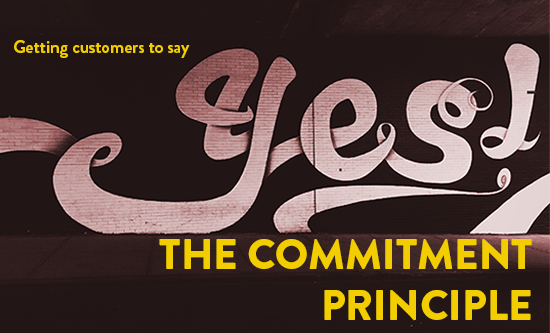The term ‘commitment principle’ was coined more than thirty years ago by Dr. Robert B. Cialdini in his book “Influence: The Psychology of Persuasion”. Despite having been around for so long, the concept remains as relevant today as ever – offering marketers a stimulating insight into the way that human beings go about making their everyday purchasing decisions.
In a nutshell, the theory states that all humans choose to act in ways they think are innately consistent with their past commitments, core values and previous actions. The theory suggests that individuals continually strive to impress upon the world their ability to be consistent i.e. to portray themselves as logical, reliable and dependable – all universally desirable character traits.
Try to think back to the last time you were dealing with a fickle individual, who changed their mind often, chances are that you perceived them as unreliable and unstable. On the other hand, when you deal with individuals who make a decision and stick to it, those earn a reputation of being reliable and intelligent.
As marketers, it’s our job to understand the way that individuals think, so that we can effectively engage and influence our customers. By acknowledging the undeniable link between ‘commitment’ and ‘action’, we can better target our interactions for more robust outcomes. The key point here is the word ‘commitment’. It is important to remember that only when a customer makes a commitment, is it significantly more likely that they may soon become a consistent customer.
To provide an example, Cialdini mentions one experiment in his book, where a group of people were given a cancer awareness button and asked to wear it for a week. Most of the participants thought it was an innocent request and agreed to wear it. A while later, these same people were asked to give a donation to help fight cancer. When comparing results, these participants donated much more money than the control group, whom did not wear a button. Why did they donate more money? Cancer fighting had become a small piece of their identity and these participants were more likely to behave as a cancer fighter would.
This tendency for humans to make a commitment and then stick with it is a core human trait that has been around for thousands of years. Whether it is in people’s political leanings, choice of brands, or personal relationships, once people are ‘committed’, they often become consistent in their actions. Influencing people via marketing is no different.
When designing your next marketing propositions, try including some form of commitment for your customers to latch on to. Whether it’s a survey, free webinar/sample or mailing list sign-up, the key is to start small and make it easy for customers to commit.
 By Helena Woo, Strategic Customer Engagement Director at DA.
By Helena Woo, Strategic Customer Engagement Director at DA.
With over 25 years of experience in data-driven marketing, she is constantly looking for ways to innovate, leading the strategic vision and value proposition for our clients. Helena has helped clients across industries achieve their marketing goals, marrying data and technology to deliver great customer experiences.
[pardot-form id=”46577″ title=”Blog Sign up test1″]



